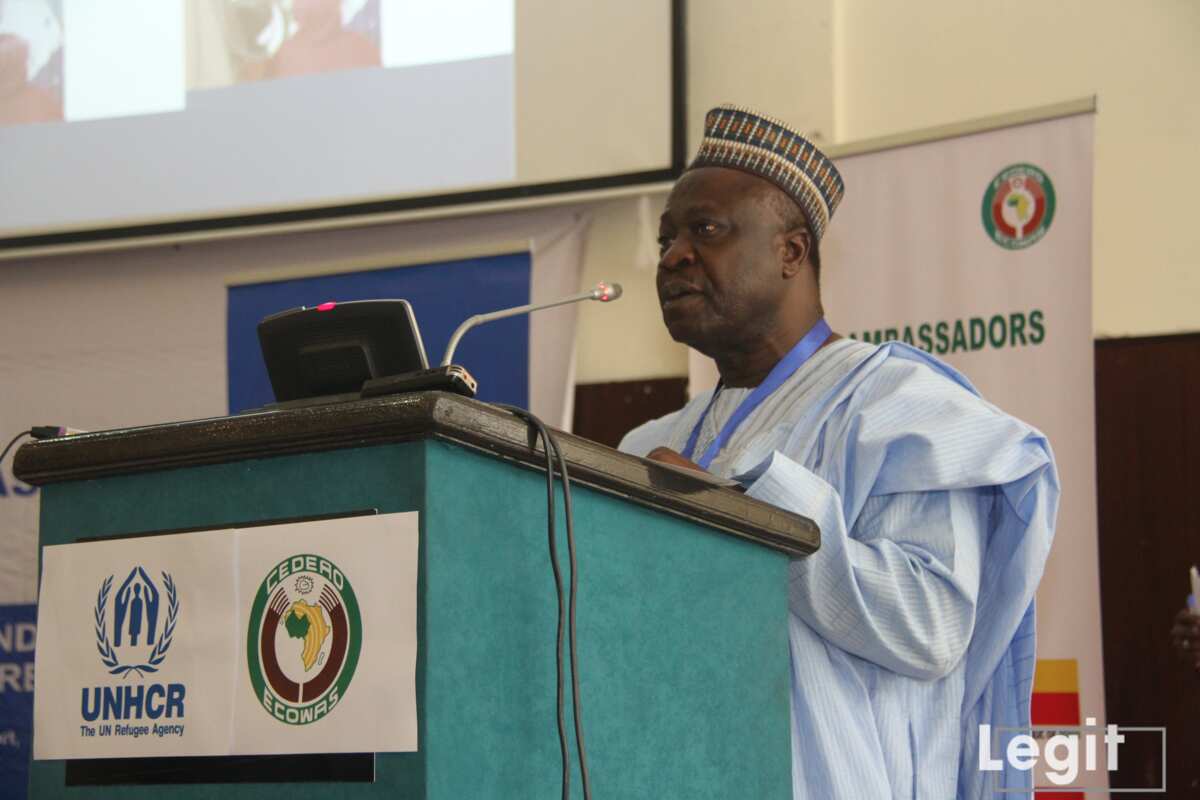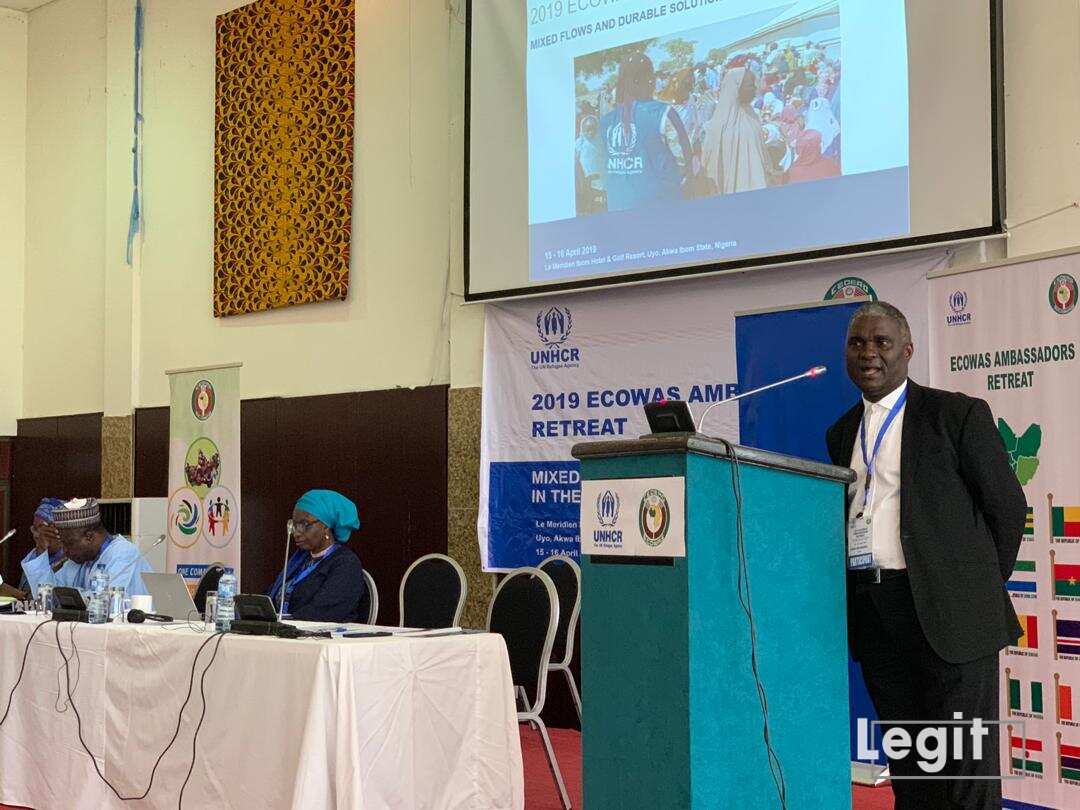- UNHCR has hailed partnership with ECOWAS in tackling humanitarian challenges in Africa
- The UNHCR's regional representative, Liz Ahua, said the partnership has proved very useful and created an avenue for regular stock taking of progress made in shaping a better future
- Ahua stressed that the UNHCR would continue to work with governments of all concerned countries to mitigate if not eradicate these problems
The United Nations High Commissioner for Refugees (UNHCR) regional representative, Liz Ahua has hailed the collaboration between UNHCR and Economic Community of West African States (ECOWAS) in tackling myriads of humanitarian challenges in Africa.
Legit.ng reporter, Olajide Adelana, reports that she made the remarks at the opening ceremony of joint ECOWAS-UNHCR retreat for ECOWAS ambassadors in Uyo, on Monday, April 15, with theme: “Mixed population flows and durable solutions in the ECOWAS region.”
READ ALSO: NAIJ.com upgrades to Legit.ng: a letter from our Editor-in-Chief Bayo Olupohunda
Ahua stated that UNHCR’s partnership with ECOWAS which also includes the ECOWAS commission, ECOWAS parliament, and ECOWAS court of justice has proved very useful and created an avenue for regular stock taking of progress made in shaping a better future.

The permanent representative of Nigeria to ECOWAS and chair committee, Amb. Babatunde Nurudeen, delivering welcome address in Uyo, Akwa Ibom. Credit: Olajide Adelana
Source: Original
She observed that the retreat is one of the foremost regional initiatives birthed by the partnership between ECOWAS-UNHCR some 12 years ago.
“The UNHCR-ECOWAS partnership has been actively instrumental in advocating at a political level, for the protection of displaced persons and other affected populations, raising awareness about UNHCR’s work and ensuring the commitment of member states to the protection of displaced persons'', she said.
One of the successes Ahua ascribed to the partnership is the momentous results in statelessness which has led to the ratification of both 1954 and 1961 statelessness conventions by West African countries.
She said only three countries were yet to sign the two statelessness conventions, thus making the region one of the most advanced regions in that regard in the world.
Statelessness which occurs when a person is not considered as a nationality of any country has become a major issue worldwide with about 10 million people said to be stateless.
It is estimated that at least 1 million stateless people reside in West Africa and Nigeria adds significantly to this burden with over 750,000 stateless people allegedly residing in the country.
Ahua also noted the myriads of problems bedeviling the sub-region, stressing that the UNHCR would continue to work with governments of all concerned countries to mitigate if not eradicate these problems.
“Forcible displacement of people both internally and across borders remains a thorny issue. Within the Lake Chad Basin situation Nigeria, Niger, Chad and Cameroun continue to bear the brunt of the Boko Haram activities. UNHCR, working with the governments of all affected countries, has initiated two protection dialogues, organised respectively in June 2016 and January 2019,” Ahua noted.
Earlier in his welcome address, the permanent representative of Nigeria to ECOWAS and chair, ECOWAS permanent representatives’ committee, Amb. Babatunde Nurudeen, called on member states to undertake a thorough appraisal and analysis of all the factors responsible for mixed flows in West Africa and come up with durable solutions to the problem.
He also charged member states to put an end to political instability which he described as the major reason fueling migration problems in the West Africa.

United Nations High Commissioner for Refugees (UNHCR) representative to Nigeria and ECOWAS, Antonio Jose Canhandula, presenting in Uyo, Akwa Ibom. Credit: Olajide Adelana
Source: Original
The diplomat then admonished stakeholders including UNHCR and ECOWAS to ensure that the retreat is regularly organised so as to properly maximise and x-ray the achievement of previous meetings and chart a new course to tackle emerging problems in the sub-region.
READ ALSO: We’re not speaking on Atiku’s petition, APC’s response - INEC fires back
Meanwhile, Legit.ng previously reported that the the United Nations High Commissioner for Refugees (UNHCR) representative to Nigeria and Economic Community of West African States (ECOWAS), Antonio Jose Canhandula, advised the Nigerian government on the best way to tackle the spate of insecurity in the country particularly in the north east.
NAIJ.com (naija.ng) -> Legit.ng Same great journalism, upgraded for better service!
Nigeria Latest News: IDPs in Plateau - The Herdsmen Have Taken Over Our Villages | - on Legit TV
Source: Legit.ng
from Legit.ng: Latest Nigeria News Today & Breaking Naija News 24/7 http://bit.ly/2Grrds2
via EDUPEDIA24/7
Comments
Post a Comment